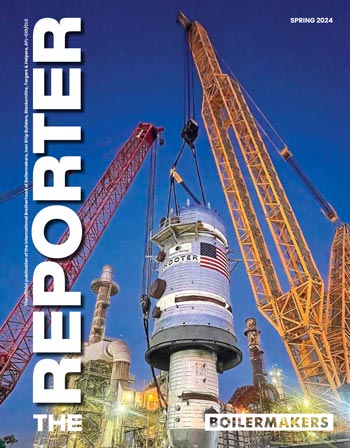The hunt was a bust. It was early October, usually the best time to walk along the small streams of central Pennsylvania in hopes of jumping waterfowl, but this year was different. The sleeves of the hunter’s lightweight shirt were pushed up and sweat blurred his vision. He’d never been so miserable while wearing camo and carrying a shotgun. The summer weather had stubbornly hung around, keeping the ducks further south, and demonstrating to the hunter that last year’s late return of autumn was no fluke; changing climate had come to his neck of the woods.
Experiences like this are becoming all too common for sportsmen, including the millions of union members who hunt and fish, as they head to the woods or water. Weather patterns and seasons have changed. Stripers are running up the East Coast later, mule deer in the west are moving into higher altitudes and coming down later in the fall, bass lakes are drying and birds are altering their migration patterns.
In response to these challenges, the IBB and 19 other AFL-CIO-affiliated labor unions stepped outside their traditional role in an effort to improve the quality of their members’ lives beyond the workplace.
On July 28, 2009, these unions, all partners of the Theodore Roosevelt Conservation Partnership, sent a letter to leaders of the Senate Environment and Public Works Committee asking that they include funding for fish, wildlife and habitat in the climate change legislation currently being considered by Congress. In the letter, the unions stressed that funds should be used to assist state agencies in implementing strategies to help safeguard fish and wildlife in a changing climate.
“We know that more than 3.2 million AFL-CIO union members spend some of their well-deserved free time hunting and fishing and that climate change has the power to change that,” said AFL-CIO Secretary-Treasurer Richard Trumka. “As fish and wildlife habitat, abundance and distribution shift in response to a changing climate, recreational activities will shift as well. Responsive measures in the Senate legislation will help prevent drastic declines in hunting and fishing opportunities caused by climate change and better secure the $70 billion conservation dollars generated by hunters and anglers each year.”
“We know firsthand that climate change already is affecting how we pursue game and fish, the success of our days afield and the timing of our hunting and fishing trips,” said IBB Secretary-Treasurer William Creeden. “Union sportsmen work hard and play hard. We have a deep appreciation for our outdoor traditions, and we want to see our leaders in Washington undertake decisive action to safeguard the future of these traditions.”







